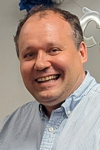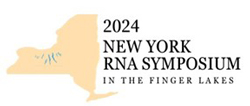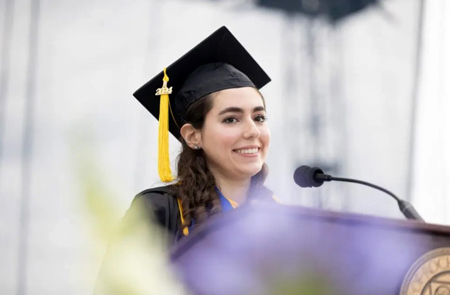News
20242023202220212020
Faculty and students proudly represent UR at the Annual Meeting of the RNA Society in Edinburgh!
Tuesday, June 18, 2024
 The University of Rochester’s Center for RNA Biology and the Department of Biochemistry and Biophysics were well-represented at the Annual RNA Society Meeting held in Edinburg Scotland, this past June. In attendance (from left) were Yi-Tao Yu, Doug Anderson, Allisa Beam, Eric Phizicky, Beth Grayhack, Yi Pan, Abby Manning, Xavier Rambout, MaryClaire Haseley, Elizabeth Abshire, Lindsey Wainwright, Eric Wagner, Peng Yao, and Maddie Jensen.
The University of Rochester’s Center for RNA Biology and the Department of Biochemistry and Biophysics were well-represented at the Annual RNA Society Meeting held in Edinburg Scotland, this past June. In attendance (from left) were Yi-Tao Yu, Doug Anderson, Allisa Beam, Eric Phizicky, Beth Grayhack, Yi Pan, Abby Manning, Xavier Rambout, MaryClaire Haseley, Elizabeth Abshire, Lindsey Wainwright, Eric Wagner, Peng Yao, and Maddie Jensen.
Dmitri Ermolenko, PhD promoted to Professor
Wednesday, June 12, 2024
 We are very pleased to announce that Dmitri Ermolenko, Ph.D. has been promoted to the rank of Professor in the Department of Biochemistry & Biophysics, as of the most recent meeting of the University of Rochester Board of Trustees.
We are very pleased to announce that Dmitri Ermolenko, Ph.D. has been promoted to the rank of Professor in the Department of Biochemistry & Biophysics, as of the most recent meeting of the University of Rochester Board of Trustees.
Please join us in congratulating Dmitri on this richly deserved promotion!
Congratulations Dmitri!!!
Jamie Butler ’02M (PhD) on Exploring the Unconventional
Monday, June 3, 2024
Listen on Apple, Spotify, or YouTube Music.
Jamie Butler, a 2002 graduate of our Biophysics program, has built a dynamic career at the intersection of science and technology. As the Vice President of Marketing at Hamamatsu, a leading company in light and technology products, Jamie leverages his extensive background in microscopy and biophysics.
Originating from Connecticut and initially attending Hamilton College for his undergraduate studies, Jamie's career journey took off in San Francisco where he engaged with emerging biotechnology firms.
His graduate experience at the University of Rochester, marked by practical lab work and valuable rotations, played a pivotal role in his professional development. Jamie's career path includes significant transitions from bench work to roles in sales and marketing, underscoring the importance of interdisciplinary skills and adaptability.
He credits collaborative opportunities at U of R and mentorship for his career progression. Jamie now offers insights and advice to aspiring scientists, emphasizing the value of asking questions, exploring unconventional paths, and fostering a rewarding work environment.
Key Takeaways
Find Your Passions: Be proactive in your academic and personal experiences to discover what truly excites you. These experiences can help you identify your specific interests and guide your career path.
Expand Your Skillset: Building technical skills and gaining practical experience can enhance your employability and open up diverse career opportunities you may not have even considered.
Get Comfortable in Your Environment: The support of a community can greatly influence your educational experience and career. Cultivate and nurture an environment that can help you thrive.
Build a Niche: Don't be afraid to ask questions and seek out areas where you can develop expertise. Finding a niche that aligns with your skills and interests can be transferable and valuable in new and unexpected ways.
Top Quotes
[05:09] "The work I was doing was really neat. It was bench work that then translated all the way up to production-level bioprocessing. So everything from Q vats and to flasks to then small fermenters to 100,000 liter fermenters that are in production in Iowa."
[09:11] "Microscopy was the theme throughout my career. The technology was easily as fascinating to me as the science itself."
[41:58] Explore the unconventional because you might find something that you really love. If you’re thinking it’s time to move away from the bench, what are some things you love about the bench — things you can take with you.
Call for Abstracts! UR & UAlbany’s 2024 New York RNA Symposium in the Finger Lakes
Thursday, May 30, 2024
 October 14-15, 2024
October 14-15, 2024
Hotel Canandaigua, a Tapestry by Hilton
205 Lakeshore Dr.
Canandaigua, NY 14424
Symposium Flyer
We are pleased to announce our upcoming 2024 New York Symposium in the Finger Lakes, co-organized and hosted by the University of Rochester Center for RNA Biology and The RNA Institute at the University at Albany. This year's meeting will be held at the Hotel Canandaigua on October 14-15th, 2024. The symposium will feature a rich exchange of information leveraging the innovative and interdisciplinary research ongoing within the regional RNA community (including primarily New England and mid-Atlantic states).
The symposium will feature keynote talks, invited faculty talks, and trainee presentations (including posters, 15-minute talks, and 1-min lightning talks selected from abstract submissions). This year’s event is trainee-focused, with a networking lunch, a trainee gathering the day before the formal meeting starts (to be held on Oct 13th), poster and talk awards, and opportunities for trainees to interact with senior scientists and industry partners.
Keynote Speakers:
- Eckhard Jankowsky, PhD, VP of RNA Science, Moderna
- Karla Neugebauer, PhD, Director, Yale Center for RNA Science & Medicine
- Sally Temple, PhD, Co-Founder and Scientific Director, Neural Stem Cell Institute
- Blanton Tolbert, PhD, (UR Alumnus) VP of Science Leadership and Culture, HHMI; Professor of Biochemistry and Biophysics, University of Pennsylvania
Faculty Speakers:
- Mitchell O’Connell, PhD, Assistant Professor, Department of Biochemistry & Biophysics; Member, Center for RNA Biology; University of Rochester Medical Center
- Kathleen McDonough, PhD, Professor, Department of Biomedical Sciences, The RNA Institute, University at Albany
Early-bird registration, abstract submission, and hotel deadline: September 13th
- Registration costs include meals and attendance for both days.
- Trainees, plan to arrive Sun, Oct 13th in time for an early afternoon event (TBD).
- Abstracts should be submitted separately using this template; see Abstracts for more info
- Abstract submission closes after September 13, 2024
- Hotel Accommodations must be booked separately from registration.
- Click here for our event hotel booking links & rates.
- UR trainees are encouraged to double-up at the 2-Queen room rate at the Hotel Canandaigua.
Visit our Symposium Page Register Today
If you have any questions, please reach out to FingerLakesRNA@urmc.rochester.edu.
Undergraduate biochemistry student delivers student address at commencement 2024
Monday, May 20, 2024

GOOD ADVICE: Undergraduate speaker, Emily Bonanno, told fellow graduates to "live in the moment, seize the day, and appreciate the joys in life." (University of Rochester photo / Keith Walters)
The Biochemistry and Biophysics Department is proud to congratulate Emily Bonnano on being selected as the Undergraduate Class Speaker for the 2024 University Commencement Ceremony. Chosen by a committee of university administrators, this prestigious honor reflects Emily's outstanding achievements and significant contributions to our university community.
Emily graduates with a Bachelor of Science degree in Biological Sciences: Biochemistry and is also the recipient of the 2024 Percy Dutton Award and the Ayman-Amin Salem Memorial Prize. We wish Emily and the entire Class of 2024 the best in their future endeavors. May they always strive to be "Ever Better." Meliora!
Biochemistry graduate student Tiana Rohe receives special fellowship
Friday, April 26, 2024
 Congratulations to Tiana Rohe, a Biochemistry graduate student, who received a special fellowship from the Department of Defense.
Congratulations to Tiana Rohe, a Biochemistry graduate student, who received a special fellowship from the Department of Defense.
The NDSEG Fellowship was established for doctoral students who are US citizens, to investigate areas which are of interest to the Department of Defense. Tiana's work will be supported by the Office of Naval Research, and is concerned with the sustainable degradation of marine plastics using vegetative, sporulated and enzymatic 3D-bioprinted materials. In addition to her support from ONR, Tiana also received an Honorable Mention for this award from the NSF.